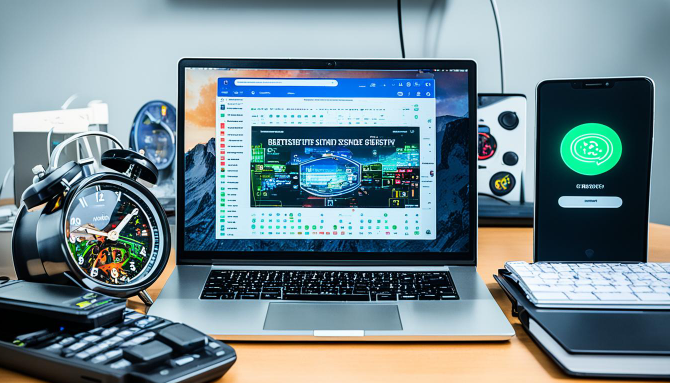College life is full of balancing acts. Students juggle studying with personal interests like gaming. They need to find a way to do well in school and still enjoy playing games like Rainbow Six.
To manage time well, it’s all about setting priorities and sticking to a schedule. Time blocking can help with this. It lets students dedicate time for both studies and games. This approach ensures they don’t neglect their studies while still enjoying their hobbies.
One cool strategy involves mixing gaming and studies through gamification. This means using games as rewards for school achievements. Also, having friends who support your academic and gaming goals can be a big help. By hearing how others have found a good balance, students can get ideas for themselves.
The Juggling Act: Understanding the Challenges
Students often juggle a lot. They must go to class, do homework, and study for tests. Adding a love for gaming brings more hurdles. To balance school and gaming, you must understand the pressure of each.
Academic Pressures
Working hard at school means less free time. Minh Lam, a junior studying Finance, finds time management tough. Projects with strict deadlines test their planning and time use.
Minh Lam and others should not do many things at once. They need to make smart plans and stick to them. This helps them do their best without getting too tired.
The Appeal of Gaming
Gaming is a fun way to take a break from study stress. Games like Rainbow Six need focus and strategy. This switch from school work is refreshing but should not be overdone.
If you enjoy gaming, make a schedule that balances both. This way, you can be good at games and school. Setting clear goals helps to keep everything in check.
Effective Time Management Strategies
It’s vital to balance gaming with school work. Students can find the right mix by using simple strategies. These help them do well in classes while still enjoying their games.
Set Clear Goals and Priorities
Goal setting is key. First, figure out what tasks need to be done right away. Then, decide on the big priorities. This advice comes from MacKenzie (1994) and Covey, Merrill, and Merrill (1994).
Setting clear goals and important priorities brings focus. It helps you perform better in school. Plus, it makes sure you have time for games too.
Create a Structured Schedule
A good plan includes a set schedule for both study and play. Dodd and Sundheim (2005) suggest planning 75% of your day. The rest is for being flexible and creative.
Put the most essential tasks at the start of your day. This boosts your work efforts. It also prevents your schoolwork from being forgotten because of games.
Avoid Multitasking
Doing more than one thing at once doesn’t really work. It just slows you down. Instead, give each task your full focus. This helps your grades and your game time.
By following these steps, you can keep study and gaming in balance. Good time management means students get more done. They can also play games without falling behind in school.
Using Gaming as a Reward
Using games as a reward helps students want to finish their school work more. In Germany, 8 out of 10 people aged 14 to 29 play video games. They can mix fun with learning by using games as a study reward.
Motivation through Gaming Incentives
Video games can meet our needs for feeling skilled, free and connected. A study shows games make the brain feel rewarded and ready to work hard. This can turn learning into something exciting, making students more interested in their lessons.
Structuring Reward Systems
It’s important to be disciplined when setting up reward systems. Gaming should be allowed only after school tasks are done. This way, point systems in game-like learning can motivate without causing distractions.
For example, award points for every school goal achieved. These points earn students a gaming session. This makes learning more fun. Yu-kai Chou points out that gamification is more than earning points. It’s about forming good habits and enjoying games guilt-free.
Learning from games like “World of Warcraft” and “Portal” can be helpful. They offer steady rewards and help players learn over time. Doing the same can make students succeed in school while still enjoying games.
The Role of Support Systems in Balancing Life
Support networks are key to a balanced life for students who love to game and study. They boost the ability to schedule well and stay productive. This is by offering help with studies and a feeling of belonging.
Academic Support
Getting help with school work is very important. Schools and colleges provide counseling and tips for managing time. These help students do better in school while still enjoying video games.
Community and Peer Support
The gaming community is a great place for students to help each other. Here, they can share how they manage school and gaming, offer time-saving advice, and create game-school schedules. This can make it easier to do well in studies and play games.
Having support from both school and gaming friends makes a big difference. This way, students can handle school and games better. Strong support and advice help make a balanced life possible.
Balance Time: Creating Harmony between Gaming and Studies
Balancing gaming and school work needs good time handling and smart plans. Making school tasks a priority while still enjoying games can make students feel good and help them succeed later. Creating clear schedules for study and play helps use time well.
Playing games in moderation is key to doing well in school. A smart time plan, like the Pomodoro method, breaks study time into small pieces with breaks in between, boosts how well students work. Technology like time tracker apps lets students see if they’re using time wisely for both gaming and studying.
It’s good to set limits on how much you game to keep a healthy life. Taking regular breaks keeps you alert and stops you from getting too tired. The 20-20-20 rule is great advice: take a 20-second break to look at something far away every 20 minutes. Doing this helps your eyes and makes you feel better. Talking with friends who understand or teachers can also keep you on track.
Thinking about what works and making changes is important for balance. It’s key to look back and fix things in your schedule. This helps students find a good mix between gaming and studying. Learning how to deal with stress by doing things like meditation and staying active also plays a big part in feeling good. This way, interests in games and school can fit well together.
Identifying and Overcoming Common Challenges
Finding common challenges is a key step in balancing gaming and study time. Knowing the signs and making changes can help find good solutions.
Signs of Imbalance
Problems show up when we put off homework, do worse in school, or spend too much time playing games. Recent stats show the average US worker spends over half their day on tasks not adding value. This costs companies a lot of money every year. Not taking enough breaks can make people tired and less focused, which can hurt grades. Feeling no motivation can make it hard to manage time and be productive.
Solutions and Adjustments
To tackle these issues, it’s vital to see the problem and adjust your routine. Using tools like time management apps and the Pomodoro method can work wonders. With Pomodoro, you set a timer to focus for a set time and then take a short break. This helps get more done without getting too tired.
Using the right tools stops you from wasting time, and giving out jobs, deadlines, and checking on progress fights procrastination. Also, making your study spot quieter to cut back on distractions can boost your focus and work better. Taking regular short breaks can keep you from getting too tired, helping you keep a good balance between games and school work.
Using Technology to Your Advantage
Modern technology is great for balancing gaming with studies. Time management apps and self-regulation tools help a lot. They track and limit gaming times to make sure school work gets done too. With these technology aids, students can keep a steady schedule. This prevents gaming from getting in the way of school.
Time Management Apps
Digital platforms offer many productivity apps. These apps help students plan their days. They have calendars, reminders, and track progress. By scheduling study and game times, students stay organized. They make the most of their time while still having fun.
Self-Regulation Tools
Software tools can help with self-control. Some apps, for example, limit gaming during study hours. These tools show how you use digital devices. This helps use tech in better ways.
Real-Life Success Stories: Learning from Others
They help students find inspiration to balance school and gaming. These stories show how setting goals and finding role models can lead to success.
“Flow” is a key point, introduced by Mihaly Csikszentmihalyi. It’s a state where you’re fully focused on what you’re doing. This can make you perform better and feel happier. Many successful people feel their best when they’re fully into their work or activity.
Dr. Michael Joyner suggests focusing on just one thing for better results. Nic Lamb, a big-wave surfer, tells us to give our best to succeed. Following their advice can help students manage both study and gaming time.
Using your time wisely is vital. Top CEOs, athletes, and freelancers concentrate on what’s most important. This might mean less free time. But, by having clear goals and a plan, you can still enjoy life outside of work or sports.
Learning from peers is also key. Talking to friends who have found a good study-gaming balance helps. They can share tips on reducing stress and staying healthy. These real stories show that taking care of yourself is important in being successful at both study and gaming.
Some interesting facts support these success stories. For example, most successful people never stop learning. They also think it’s important to meet others in person and work in teams. Making efforts to keep learning and connect with others can really help you succeed.
Finally, balancing work and fun is crucial. This way, you can be happy in all areas of your life. By studying success stories, students can learn how to mix study and gaming well.
Conclusion
Keeping a balance between gaming and studying is about planning well and managing time wisely. It’s key to put your school work and gaming first. We’ve looked at important strategies here, like setting clear goals and creating a schedule. These things can make a big difference.
Having support from others, especially for school, is crucial. It helps keep things in check. You can also use apps and tools to help manage your time. Real-life stories of success can inspire you. They show that you can do well in school and gaming.
Looking at this from a big picture, balancing games and school has many benefits. It teaches you skills you can use in all parts of your life. This approach helps students do well both in school and in gaming. This leads to a great college experience.
FAQ
How can I effectively manage my time between gaming and studying?
To manage time well, set clear goals and make a schedule. Try not to do too many things at once. Use gaming as a reward for studying. Time management apps are also great tools to keep you on track.
What are the main academic pressures that college students face?
College students feel pressure from classes, assignments, and exams. They also want to do extracurricular activities. It’s hard to balance all this with gaming without managing time well.
Why is gaming so appealing to college students?
Gaming is a fun way to take a break from school work. Games like Rainbow Six offer a feeling of success and calm. This entices students to play when they need a rest from studying.
How can setting clear goals help in managing time for both gaming and studying?
Clear goals help you focus. Knowing what you want to achieve in school and in games, lets you use your time well. This ensures you get your work done and still have time to relax.
What is the importance of creating a structured schedule?
A schedule divides your time for studying and gaming. With a plan in place, you’re less likely to put things off. This helps make sure you have time for both school and fun.
Why should students avoid multitasking?
Doing too much at once can make you less productive. It’s better to do one thing well at a time. This makes studying and gaming more satisfying and effective for students.
How can gaming be used as a reward system?
Use games as a treat after you’ve finished your school work. This helps motivate you to work hard before you play. It takes discipline to use games in this way rather than as a distraction.
What types of support systems can help students balance gaming and academics?
Students can get help from school support like counseling and time management workshops. Community support and tips from friends who also game help too. These can offer advice and keep you motivated to balance everything well.
What are some signs of an imbalance between gaming and studying?
If you find yourself putting off school work, grades drop, or you’re gaming too much, these are signs. Recognizing these signs early helps you make changes. This helps you focus on school when you need to.
What technological tools can help manage gaming and studying time?
Apps that help with time and self-regulation are good for keeping track of your time spent gaming. They can also limit when you play. This balance keeps your school goals in focus.
How can real-life success stories inspire students to balance gaming and academics?
Real stories of students who have balanced gaming with good grades offer insights. They show the value of planning, hard work, and staying healthy. These tales can encourage and guide others to success.

More Posts
Top 7 Planners for ADHD People: Improve Focus & Productivity
Managing the daily chaos can be overwhelming in a world that constantly demands our attention, especially for individuals with ADHD. The struggle to stay focused, organized, and productive is a familiar battle that...
How to Write an Effective Vision & Mission Statement?
A compelling vision and mission statement makes a huge difference for your productivity and decision-making. Learn how to write them the best way!
7 Top Task Management Software for Teams
In the ever-expanding digital universe, team collaboration and organization are pivotal for success. Task management software for teams has become a lifesaver, streamlining processes and ensuring all tasks are timely. From sticky notes...
10 Effective Workload Distribution Strategies
Distributing workloads effectively is essential to [maintaining productivity](https://weekplan.net/top-team-productivity-softwares/) and harmony in the workplace. When tasks are unevenly assigned, it can lead to burnout, missed deadlines, and strained relationships within teams. On the other...



